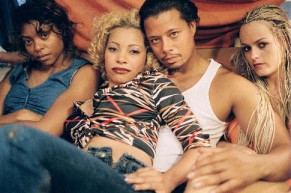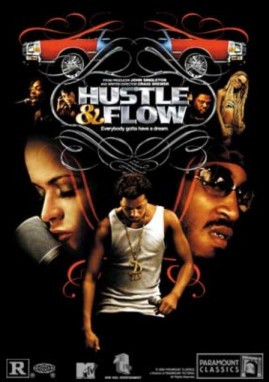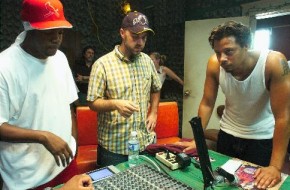|
Hustle
& Flow
Make no bones about it, Hustle & Flow is in
contention for the best of the year. Sure, it’s a
bit early to start making such bold statements, with award
season not quite right around the corner. Regardless, Craig
Brewer’s ode to the creative expression and struggle
is the best you’ll find out there, at least up to
this point.
Written
and Directed by Brewer, Hustle & Flow begins
with a grand throwback to seventies film with an opening
sequence title pause timed so perfectly that it practically
grabs you by the eyes and commands that you acknowledge
what is about to unfurl on screen.
DJay
(Terrence Dashon Howard), a hustler in the truest form,
spends most of his time in his car, pimping his wares, which
range from women to marijuana or “gateway” as
he calls it, on the streets of Memphis.
DJay
has his routine set in stone, cruising the streets with
Nola (Taryn Manning) facilitating back seat deals to whomever
comes looking for a quick fix of carnal pleasure, while
Lexus (Paula Jai Parker) works a strip club to pull in lap
dance twenties any which way she can. This arrangement doesn’t
afford DJay and his women riches, but it pays rent and affords
the expecting Yevette (Elise Neal) the opportunity to stay
home while carrying her child to term.
When
DJay makes a drop-off at Arnel’s (Isaac Hayes) roadside
dive, he is given news that sends his world into a gradual
tailspin. Successful rap artist Skinny Black (Ludacris)
is set to make his annual Fourth of July visit to his former
hometown of Memphis, and Arnel’s is his locale of
choice to hold his homecoming bash. DJay is called upon
to provide the best of his product, marijuana not women,
because in previous visits he was only able to scratch out
dirt weed for Skinny, and he never hears the end of it.
Should DJay deliver, Arnel promises to introduce him to
Skinny.
 |
This
is the first of a series of serendipitous events that lead
DJay to formulate a plan, one final stab at making something
of himself before it is too late to turn back. Subtlly,
Brewer’s brilliant brush strokes begin showing through.
Hustle & Flow is not simply the swan song of
a failed rapper making one last thrust towards greatness.
The film is about much more than that, in that it reflects
the hopes and dreams of anyone wishing to produce a work
of art, whether it be music, film, or written word.
Transcending
the facets of what could have been a simple genre film detailing
the struggle of one man to succeed Brewer instead concocts
a film so vividly pure in spirit and drive that it seemingly
peers into the souls of any DIY artist who knows they have
something to contribute to the world, yet feels held down
at every turn. This is their tale, and regardless of skin
color, race, creed, or medium, this is an account of their
struggle.
DJay
is confronted with the tools for success all around him,
but he can’t seem to put the puzzle together fast
enough. He knows he once had skills, but he can’t
seem to find a way to harness any of them in any way that
will make a difference.
Adding
to the tribulations of choosing a line of work that essentially
preys upon human behavior, DJay is on the verge of a mid-life
crisis. At one point he confronts Yevette, explaining “My
Daddy, his heart gave out on him when he was my age.”
This scene plays brilliantly because Yevette doesn’t
quite understand what DJay is about to say, thinking that
he is about to tell her that she needs to leave because
she isn’t bringing in any money.
Instead,
DJay is touching right to the impetus of his efforts. His
mid-life crisis stems from reflecting on his father’s
early passing and perhaps realizing that should he befall
the same fate, he hasn’t really accomplished much
with the time he’s had so far.
He is
captivated by comparing his life to Skinny Black’s.
DJay recalls his time spent rhyming and dee-jaying while
Skinny was eagerly putting together mixes to rhyme over
at a neighboring school. The parallels cause DJay to fixate
on his squandered ambitions, and slowly but surely opportunities
begin cropping up all around him.
Accepting
a beat up keyboard as a junkie’s payment for a hit
leads to DJay stringing together some musical beats at home.
A chance encounter with an ex-schoolmate Key (Anthony Anderson)
leads to a connection with someone with access to microphones
and recording expertise. Key happens to know someone with
access to sampling equipment and a sense of beat and brings
Shelby (DJ Qualls) into the fold.
As the
surrogate family begins to gel together with a common purpose,
obstacles threaten to curb their makeshift recording sessions
every step of the way. However, DJay and company find ways
to incorporate their struggles into the process, making
due with their given resources, and finding purpose in each
roadblock that comes their way.
Brewer’s
cast is absolutely stellar, with Howard leading the charge
in what will hopefully prove to be an award worthy performance
in the coming months. Anthony Anderson is finally given
a role that he can sink into without becoming the butt of
any cheap weight jokes, while DJ Qualls is never played
for one note comic relief. Sure, there are a few laughs
here and there, but his enthusiasm and dedication to the
cause, let alone the music, is never played falsely, and
the film is all the better for this.
“Everybody
gotta have a dream” is the tagline attached to the
film, and nobody knows this better than Brewer. He has suffered
for his craft, and Hustle & Flow is a direct
testament to the importance of the struggle. “Everybody
gotta have a dream,” and Brewer’s dreams will
hopefully be coming true in due time.
Rating:

|








